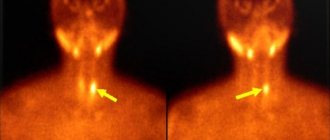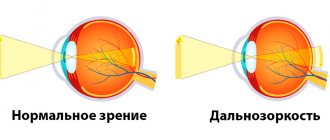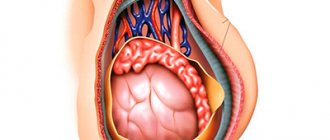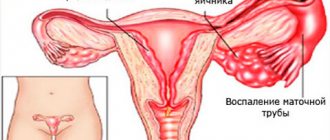- September 7, 2018
- Nervous system diseases
- Ekaterina Kholodova
If your wife is hysterical, it’s sad, but you have to deal with it somehow. Hysteria is a nervous attack that manifests itself in unexpected transitions from laughter to tears. It seems to be a woman's disease, but men also suffer from it.
Even in Ancient Egypt, it was believed that any illness in women occurs because the uterus (in Greek “hyster”) wanders throughout the body, dissatisfied, and clogs vital canals. With the development of medicine, conclusions were drawn that the uterus in the female body is in one place, but all sorts of abnormal processes occurring in it poison the woman’s soul. Hysteria began to be associated with sexual disorders, resulting in such a purely female illness.
Russia
There have been rumors about demoniacs since the 11th century. In the 17th-19th centuries in Russia, hysterical women were called cliques. Traditionally, it was believed that in their fits they shouted out the name of the one who cast the spell on them. Therefore, those who were called klikushi were brought to trial in the 17th century, they were accused of witchcraft, tortured, and the klikush were punished by reprimanding. At the beginning of the 18th century, it became clear to Peter the Great that cliques often pursue the goal of slandering the innocent, so they began to be brought to justice. Fake demonization was a common occurrence in those days.
Hysterical today
Today, hysteria is an unofficial disease related to character accentuations and psychopathy. Currently, the diagnosis is not officially used in either the ICD-10 (International Classification of Diseases, Tenth Revision) or the American manual of mental disorders DSM-5. The ICD has more specific diagnoses that can be given to a hysterical girl:
- histrionic personality disorder;
- somatoform disorders;
- dissociative (conversion) disorders - conversion hysteria, conversion reaction, hysterical psychosis;
- dissociative movement disorders, including cases of partial or complete paralysis;
- loss of sensory perception and others.
Forecast
As a rule, with a professional approach, hysteria can be easily corrected. If a person lives in favorable conditions, everything is normal in his personal life and work, then coping with the disease is not difficult.
Although in some cases certain elements of demonstrative behavior may remain. As a person grows older, he becomes more serious and wiser. Thanks to the help of a psychotherapist, he learns to use his character traits for his own benefit.
A less optimistic prognosis for those patients who suffer from autonomic disorders provoked by hysteria. Decompensation in such patients occurs in old age.
If the patient is prone to pathological fantasizing, then treatment becomes more complicated. All of these people are chronic liars. Moreover, they deceive without any specific purpose; their lies make no sense. The progression of the disease can lead to the fact that a person begins to denigrate himself. For example, he may confess to a crime he did not commit. If such a patient is not treated, there is a possibility that the personality will deteriorate.
What contributes
Hysteria is a painful hypertrophy of human character traits, which is based on a certain method of nervous response inherent from birth. The disease progresses and flourishes during education and if there are no restraining factors.
Who is this hysterical wife? This is a creature that you, a man, have most likely allowed to blossom like this. Even if she came from her parents like this, then you, a man, could not reason with your lady, whose abnormality and rage are dangerous to society.
Which doctor should I see for hysteria?
The diagnosis and treatment of hysteria is carried out by specialists such as neurologists and psychiatrists.
Video: detailed description of hysterical neurosis. The causes and methods of treatment are considered. Hysteria as a way to attract attention in order to get what you want:
Hysteria is dangerous because it is often confused with character traits. For a long time, patients believe that the reason for their inappropriate behavior is simple overwork. In fact, changes in the psyche should not be ignored. Moreover, hysteria can lead to deafness and blindness. The disease requires identification and treatment.
During the appointment, the doctor will examine the patient and conduct a series of neurological tests on him. A psychiatrist assesses a person's psychological status. To assess a person’s health status, it will be necessary to conduct electroneuromyography, EEG, MRI, CT. The doctor must decide which diagnostic test is required for a particular patient.
What do hysterics achieve?
The hysterical woman yells at her children, husband, parents. Her goal is to get what she wants by shouting, threatening, and unnerving people around her.
We encounter hysterics in life, realizing later that these ladies were raised in families where they were given complete freedom, there were no restrictions on the part of their parents, any whim was often fulfilled due to lack of love: “as long as it doesn’t interfere.”
The hysterical woman screams and attracts attention to herself; this is the only method available to her. She does not know how to convince or argue. When a woman shouts at her husband, makes scenes for him with or without reason, then she, in fact, demonstrates her loneliness and abandonment, her demands, in principle, are not so important, her main goal is to attract attention to herself. She wants to be noticed and pitied. Children behave in exactly the same way at a display case with an unpurchased toy. Mature and conscientious women are unlikely to agree to such methods.
Treatment of hysteria
Hysteria is characterized by prolonged development. Many patients adapt to its manifestations. They indicate that they are simply shocking individuals and society accepts them. Other people are not able to put up with mental changes, since hysterical attacks lead to problems in relationships both with loved ones and with work colleagues. These people need help.
First aid for a hysterical attack
In order for a person to have an attack of hysteria, a traumatic effect must be exerted on his psyche. Most often it is quite long.
Since an attack often follows the type of epilepsy, you need to be able to provide first aid to patients:
- People who surround a person having a seizure should themselves remain as calm as possible. The more emotionally they react to the patient’s hysteria, the longer the attack will last. You should act as if nothing strange is happening. If the patient feels attention, he will strive to attract it even more.
- If there is such a possibility, then the person should be taken to a separate room and put to bed.
- Items that could cause injury must be removed.
- The fewer strangers there are around, the better. If they begin to express sympathy out loud, the attack will become more and more severe.
- You can bring cotton wool soaked in ammonia to the patient’s nose.
- You should not get too close to a person having a seizure. The attack will pass if the patient understands that with its help he cannot achieve the desired effect.
A person should not be left alone, as during an attack he may attempt to demonstrate suicide. It may be dangerous.
Psychotherapy
Psychotherapy allows you to get rid of hysteria. Treatment fails only when patients use their illness to gain some benefit. For example, so that he receives attention with or without reason.
- Psychoanalysis.
This is a method of providing a complex influence on the patient. With its help, you can not only get rid of hysteria, but also identify the causes of the development of this disorder. If you understand why a person has hysteria, you can choose the best ways to influence him. To do this, you will need to “dig” into childhood memories and other age periods of the patient’s life. A competent psychoanalyst will be able to connect the events of a past life with what is happening to a person today.
- Group and family psychotherapy.
These methods allow the patient to evaluate himself from the outside. If he learns to empathize with other people and receives positive emotions from this, then his problem will be resolved. Psychodrama is one of the methods of psychotherapy. The patient is asked to take on the role and experiences of another person. At the same time, a conflict situation plays out. Family psychotherapy allows you to get rid of interpersonal conflicts within the family. Relationships between adults and adults, adults and children are explored.
- Cognitively-behavioral psychotherapy.
This is one of the most effective methods of treating hysteria. The doctor tells the patient how to get out of problematic situations in order to get the most positive result. All techniques are worked out in practice. A person is given certain limits within which he must realize his needs.
Drug therapy
If the patient has severe symptoms of depression, he is prescribed medications. When hysteria and depression are combined, the use of MAO inhibitors, tetracyclic and tricyclic antidepressants is indicated. Provided that the therapy has the desired effect, the drugs are gradually withdrawn. During the period of recovery from depression, the patient must be monitored, since at this time thoughts of suicide may still haunt him.
Drugs that can be used in the treatment regimen:
- Sedative phytomedicines.
- Sleeping pills. They are prescribed when the patient is plagued by insomnia.
- General strengthening agents.
Psychologists
Hysterical individuals are excellent psychologists who know where and when to apply pressure, where the interlocutor’s pain points and weaknesses are. They are able to portray arrogance and defenselessness, incredible stubbornness and impeccable submission.
Types of hysteria:
- Passive: the lady withdraws into herself and does everything under pressure, making it clear that if she does something, it is to make things even worse.
- Active - a hysterical wife, destroying everything she sees, breaking dishes, throwing away things that are dear to you, raising her hand against herself or those around her.
And it is not clear which of them is worse. It is possible to establish contact with such ladies by promising to make concessions. But if you give in once, if you adhere to this style, you can become his hostage. The hysterical lady plays for the audience, and as long as there is someone to “enjoy” this performance, her play goes off with a bang. The meaning is lost only when there is no one to react to her performances.
A hysterical person is an innate personality type, but you can play on the weaknesses of such ladies - it will even be interesting in bed. Such women carry their own negativity even in intimacy. They blame the man for his imaginary frigidity or inability to achieve orgasm.
Clinical manifestations
The intensity of symptoms depends on the number of people nearby. A person develops demonstrative behavior, an attack occurs unexpectedly and also disappears.
Hysteria can be identified by the following motor symptoms:
- for impaired coordination of movements;
- tremor of the limbs;
- loss of voice;
- convulsive syndrome;
- muscle tics.
Hysterical paralysis does not cause muscle tissue atrophy. The patient tries to feign fainting, thrashing about or wringing his hands. If something distracts him at this moment, then the intensity of the clinical signs decreases.
Sensory lesions are characterized by problems with sensation. It sharply increases or decreases, or disappears completely. Patients themselves point to numb areas of the body, painful sensations in different points. During an attack, they stop seeing, hearing, and perceiving colors. Orientation in space is preserved.
Autonomic symptoms of the pathology manifest themselves:
- attacks of nausea with vomiting;
- breathing problems;
- painful sensations in various organs, including the heart;
- false spasm of the esophagus, inability to eat;
- cephalgia, obsessive itching, dizziness.
Interesting symptoms of hysteria include theatrical seizures. With them, the patient tries to focus attention on himself and his desires. Bending the body and falling to the floor are adjusted and safe for the patient. Suffering is manifested by loud sobs, waving of all limbs, hitting the head on hard surfaces, and loud laughter. At this time, consciousness is completely preserved, the face appears pale or red.
You can distinguish a hysterical attack from epilepsy using the above signs. In the first case, you can revive the patient with cold water or a slap in the face.
Stronger sex
A hysterical man—it doesn’t even sound human. There are typical female ailments, for example, anorexia. Likewise, women are mostly susceptible to hysteria.
Doctors and psychologists believe that hysteria in men can manifest itself as abdominal pain, which symbolizes the desire for pregnancy. According to the dictionary of psychoanalysis, a man with hysterics declares himself as a subject belonging to the female clan and making attempts to realize his virility through seduction, and the world must accept him as unique. With his behavior, this man makes a woman beg for a date with him as a gift from God, and a night with him is the highest reward on a planetary scale. A hysterical husband is an unbearable person.
The Taming of the Shrew: turning the three whales to face us
The principle of reasoning with girls of this type is very simple: the hysterical woman must be brought to the point that she herself wants to do what you expect from her.
They have three main character traits that can be turned to the benefit of the person living next to such a lady. You can use their assertiveness, theatricality and suggestibility for your own purposes. Since they think it is possible to manipulate you, you too should be cunning. Instill in the young lady what you would like to receive from her, let her think that this is her idea, and you will readily, marveling at her ingenuity, follow her lead. Let there be slight hesitation on your part - the hysterics will have their leadership pride satisfied. With encouragement and deterrence, you will play on her assertiveness. Don't overdo it. By developing your imagination, you will turn your life, including your sexual life, into a good theater with a hysterical prima, where in fact you are the main puppeteer. And sex with such an emotional lady is simply unforgettable. The main thing is to gently inspire her with what you want yourself, and you will create in bed what you need, having received an obedient, excellent lover.
But there should be no pressure, she should think that she decided this herself, and under no circumstances should she figure out your game.
Clinical forms of hysteria
Depending on what type of disorder prevails, the forms of hysteria can be as follows:
- Hysterical paralysis. A person's muscles become weak, and the arms and legs are the first to suffer. As a result, he cannot move them normally.
- Hysterical disturbances of sensitivity. This may include pain and numbness of the skin in various parts of the body.
- Hysterical astasia-abasia, that is, gait disturbances. The patient cannot walk, and when trying to rise to his feet, he sways violently in different directions.
- Hysterical blindness. The patient loses the ability to see with one or both eyes.
- Hysterical deafness. Hearing is absent in both ears, but sometimes it is reduced in only one ear.
- Hysterical convulsive attacks. This form of hysteria is characterized by the appearance of uncontrolled movements of the limbs. At this time, the person may lose consciousness.
- Hysterical mutism. The patient cannot speak, but at the same time points to his lips, indicating that speech is impossible.
- Hysterical amnesia. A person may lose their memory for a short period of time.
- Hysterical coma. The patient loses consciousness. He does not react to everything that happens around him, does not speak, does not open his eyes, does not respond to his name, does not feel pain. Coma can last from a few minutes to several days.
Such a unique medical phenomenon as mass hysteria deserves special attention. It proceeds like a mental epidemic. Scientists explain this phenomenon by the increased suggestibility of many people. Mass psychosis rarely occurs. In this case, a violation of the perception of the world develops in several people at once. Mass hysteria is used as evidence that people are subject to the herd instinct.
Symptoms
Not talking about cases with sick people who suffer from “hysterical disorders” and “dissociative mental disorders”, but when talking about normal women, we understand that many of them in certain situations have a tendency to behave like hysterics. And these are most likely the majority. Usually they are:
- they create a scandal practically out of nowhere, and give out negative things about it or without it;
- they calm down with difficulty, and when they get excited, they almost completely lose control of themselves;
- recognize the loss of control over emotions and their own inadequacy as soon as they recover from the attack.
A man living with such a woman is always to blame for her - under the influence of her bad mood, which periodically rolls over her, every now and then she irritates him with her accusations.
The danger of hysterics is that women are ready to relinquish all authority over their behavior and mental state and transfer them to their partner, because they themselves cease to believe that they are able to control themselves. They experience a burning feeling of guilt before their loved ones. Some male predators are happy to use entrusted power for their own purposes.
By admitting his incapacity, a person automatically waives his rights. And he becomes a slave.
Causes of hysterical neurosis
External and internal factors can provoke the development of hysteria. Also important are the characteristics of the emotional sphere of a particular person, the characteristics of his personality and suggestibility, which affects the course of the patient’s thoughts and his emotional state.
Internal personality conflict can cause hysteria. Often the impetus for the development of the disease is stress, in which a person is forced to restrain his own emotions. He suppresses them and does not show negative experiences.
Society, in itself, develops hysteria within every person. People who are emotionally weak are unable to suppress negative emotions for a long time. One day they will come out, which will be expressed in inappropriate behavior.
Risk factors that can lead to the development of hysteria:
- Somatic diseases.
- Physical and psychological trauma.
- Taking sleeping pills and tranquilizers without medical supervision.
- Alcoholism and drug addiction.
Hysterical neurosis is a frequent companion of people who grew up in dysfunctional families. The disease can also develop in people who are in unusual circumstances. We must not forget about such individual personality characteristics as the character and psychotype of a person.
Psychologists have identified reasons that can lead to the development of hysteria:
- Mental immaturity.
The modern individual is becoming younger not only in body (the desire to remain young as long as possible), but also in soul (infancy persists longer than in past years or even centuries). Many children grow up to be suggestible and impressionable. They have reduced independence, and many of them are selfish. Such mental disorders are a consequence of the characteristics of upbringing, as well as the goals that are set for a person. From childhood they are set up to be successful, which is not always possible in real life.
- Emotional turmoil.
Conflict situations, difficulties, and everyday problems have a negative impact on mental health. A person encounters them every day. People with a strong psyche calmly overcome all stress, but an emotionally weak person breaks down. As a result, he develops hysteria.
The mechanics of hysteria
Sadism is the suppression of one's emotions. If you have had a violent emotional explosion, anger, resentment and pain are splashed out, you experience a huge feeling of guilt. If you managed to restrain yourself, be proud of yourself. There may be several such pre-hysterical situations, or there may be many; everything is individual and depends on how much patience a person has. If you constantly suppress emotions, they accumulate, tension reaches the limit, and hysterics arise.
In most cases, neither the woman nor her partner is to blame. Efforts should be directed not to blaming yourself or to shame - try to change the situation. The loss of control is not special and completely unintentional; scolding yourself is completely useless, it only causes harm.
The partner-spouse is most often not to blame either, but what to do? The hysterical wife finds herself in such a disposition with her husband that she bursts into violent anger. Something should be changed, taking into account the interests of the partner.
The potential for hysteria accumulates when a woman feels that her beloved man, whom she trusts, her husband, partner, the one to whom she has entrusted her life, is slowing her down with his behavior or words, preventing her from trusting, instilling in her a feeling of fear, not giving to open up to her, to be able to completely dissolve in him, to love him, to receive full pleasure from life with him.
A woman constantly experiences frustrations, her love for her partner does not grow, she is constantly depressed and oppressed. And one day a storm of aggression rises in a woman, like a tsunami, because suppression is like a spring, the more you compress, the greater the return. And every little thing usually serves as a reason for hysteria. If the occasion is serious and major, the woman gets ready, puts aside her emotions and begins to think about what to do to avoid a serious disaster. And an insignificant, nasty and annoying reason also subconsciously frightens her by the fact that it will again pass unnoticed, and a whole pocket has already been filled with such trifles, and the last insignificant reason no longer fits there.
And so the woman throws a huge, ugly hysteria, the insignificant reason for which allows others to think that she is mentally ill.
What is hysteria?
Hysteria is a special emotional state associated with accumulated negative energy, severe stress or nervous overexertion, which is expressed by sobbing, laughter, excessive gesticulation or a fit of violence. During a hysteria, a person gives vent to accumulated emotions, does not control himself, does not think well, and is, as they say, “out of his mind.” But with all his actions he tries to attract attention. Such an outburst of emotions does not happen to everyone. As a rule, it is characteristic of people who are emotional, creative, and easily excitable. Occurs more often in women and children, less often in men.
Hysteria as a personality quality is a tendency to periodically be in an extremely excited, painfully passionate, restless state, exciting others with similar emotions. In modern psychopathology, two types of people with hysterical character traits are distinguished: people with a psychosomatic illness or a form of neurosis (hysteria) and those for whom hysteria is a way of manipulation and gain (hysterical psychopathy). Both types demonstrate a hysterical personality type:
- They deliberately dramatize any events or actions.
- They behave theatrically in everyday or work situations.
- They strive to attract the attention of others and suffer if this does not work.
- They talk about themselves in an affective manner.
- Idealize or unreasonably criticize other people.
- They demonstrate changeable moods and exalted behavior.
- They create an additional image: they wear bright makeup, dress provocatively.
Take a personality type test
One-time “true” hysterics are similar in appearance . These may be attacks of convulsive crying, sometimes turning into laughter, accompanied by rapid breathing, redness of the face, and incoherent speech. But a genuine attack does not promise any benefit and is a consequence of negative emotions accumulated to a critical mass. True hysteria is a rare occurrence, the cause of which can be anything and anyone.
The term “hysteria” is derived from the Greek “hystera” - “uterus”, since such conditions were explained by diseases of this organ. The modern understanding of the word has nothing to do with its original meaning, but hysteria is still considered the prerogative of women. It’s not for nothing that the word “hysterical” is used only in the feminine gender.
Causes of hysterics.
Do you want to make better decisions, find your ideal career, realize your maximum potential and receive instructions for individual development?
?
All this can be done using the Human Design
. Build your map and get basic decryptions for free.
Most female hysterics are attributed to a kind of “female logic”, the peculiarities of raising girls or the influence of hormones. In fact, for every two female hysterics there is one male one, and hysteria looks the same in women and men. Suddenly, defense mechanisms cease to function, a person is faced with an unsightly reality, feels humiliated, deceived. All the dissatisfaction with life falls on the one who happens to be nearby. In this state, dishes and telephones break, furniture breaks, things are thrown out of the window.
But since hysteria is a recognized feminine quality, when performed by a man, hysteria looks impartial. Although it can be many times more terrifying and destructive. But women's hysterics are varied and inventive. This is a whole world where everything happens beautifully and colorfully, but with a specific purpose.
Consequences
Time passes and she repents. The fear of losing her partner is intensified by the fact that she has lost control, but she does not understand this, and believes that the reason for the fear that gripped her is the fear of losing a man. She will feel better because the man himself considers her a fool and hysterical and looks at her condescendingly. She puts him on a pedestal, is grateful to him for forgiving her, and that... she doesn’t require him to understand the situation deeply. The main thing is “I’m sorry, I won’t do this again!” A woman’s love blossoms, the blockage of frustrations goes away.
Unfortunately, if you leave everything as it is, the woman will repeat her behavior, and each time her hysteria will only get stronger. The hysterical woman, unfortunately, does not understand this; she did not understand the reasons, crumpling the situation and leaving the analysis for later. But next time she will not be able to restrain herself, since she did not discover the “button for controlling her hysteria” and did not look for the cause of this condition.
Symptoms of hysteria
The symptoms of hysteria are most intense when a person is surrounded by other people. His behavior becomes demonstrative. Hysteria develops unexpectedly and ends just as suddenly.
Its main symptoms:
- Movement disorders:
- The patient's coordination will be impaired.
- The hands are shaky.
- The voice may disappear.
- Muscle tics and cramps are often observed.
- Somatic symptoms.
There are certain features of hysterical neurosis that distinguish it from somatic diseases. Thus, aphonia is characterized by the absence of a voice, but a person coughs with sound. This is explained by the fact that during hysterical paralysis, muscle tissue does not atrophy. Trying to attract attention, patients often feign fainting, breathing difficulties, and may wring their hands or rush about. However, when it is possible to distract them, the severity of these symptoms becomes much less intense.
- Sensory impairments.
Sensory disturbances are expressed by increased, decreased, or complete absence of sensitivity. The patient himself can indicate which part of his body is numb. Also, patients with hysteria often experience pain in various places. Many patients indicate that during hysterics they go blind or deaf. On the part of the eyes, disturbances such as a decrease in the visual field and distortion of color perception may be observed. At the same time, a person is normally oriented in space. Deafness is often accompanied by impaired sensitivity of the skin of the ears.
- Vegetative symptoms.
The symptoms that appear during hysteria from the autonomic system are diverse.
These include:
- Nausea and vomiting.
- Deterioration of breathing.
- Pain in the heart and other organs.
- False spasm of the esophagus due to which a person refuses to eat.
- Headache.
- Dizziness.
- Itching.
Theatrical seizures are another symptom of hysteria. They are aimed at attracting attention and achieving the demands put forward. The patient can bend and fall to the floor, while the falls are quite “correct” and as safe as possible. Often people begin to bang their heads against hard objects, wave their arms and legs, cry or laugh loudly. With all his appearance, a person indicates that he is suffering incredibly. If you check the reaction of the pupils, it will be intact, the patient himself is conscious. The face may be red or pale.
You can stop a seizure with a firm slap in the face. Alternatively, the person can be doused with cold water. All of these signs make it possible to distinguish hysteria from an epileptic attack.
Treatment: learn to manage yourself. Self-analysis needed
It is necessary to understand where hysterical behavior comes from. It is important to track each of your emotions, not to let it just be, but to understand the essence of the origin of anger, resentment, and pain. By understanding the cause and essence, you can control the occurrence of this emotion. If you live in a family, it is unacceptable to poison the lives of your loved ones, just as you cannot give them complete control over yourself.
Be honest with yourself, learn to love, respect and appreciate yourself. Work, increase your self-esteem, destroy painful pride. And then you will become your own best friend and learn to trust yourself. This is the first step to happiness.










